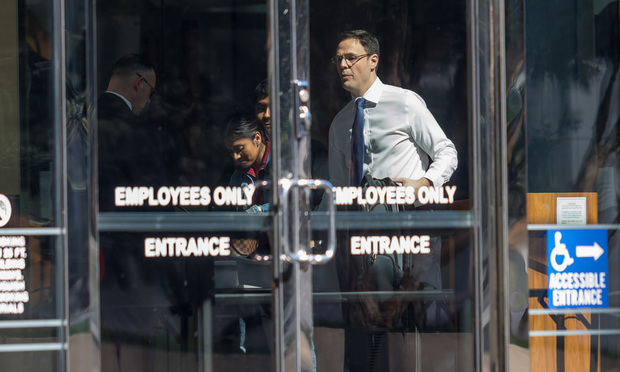Company Settles Whistleblower Case That Led to Former DOJ Lawyer's Jailing
Fortinet, a network security company, reached a deal worth $545,000 to settle a whistleblower lawsuit. Lawyers for the whistleblower say that former DOJ lawyer and Akin Gump partner Jeffrey Wertkin tried to sell the company a copy of the complaint while it was still under seal.
April 15, 2019 at 06:48 PM
4 minute read
 Jeffrey Wertkin enters U.S District Court for the Northern District of California for sentencing.
Jeffrey Wertkin enters U.S District Court for the Northern District of California for sentencing.
Federal prosecutors on Friday announced a $545,000 False Claims Act settlement with Silicon Valley network security company Fortinet Inc.
The terms of the settlement are relatively routine: The Sunnyvale-based company agreed to pay $400,000 and to provide the U.S. Marine Corps with $145,000 in equipment to resolve False Claims Act allegations. The case's route to settlement, however, appears to have been anything but normal thanks to former DOJ lawyer and Akin Gump Strauss Hauer & Feld partner Jeffrey Wertkin.
Wertkin was sentenced to 30 months in prison last year after federal agents arrested him for reaching out to an in-house lawyer at a Silicon Valley company offering to sell a copy of an underseal qui tam complaint. Federal agents nabbed Wertkin in a Cupertino hotel lobby in January 2017 wearing a wig and sunglasses and posing as someone named “Dan” as he waited with a copy of the complaint. Wertkin had been expecting a $310,000 “consulting fee” from the company, which was cooperating with authorities.
The details of the qui tam suit against Fortinet line up with the complaint that Wertkin was hawking. The target company described in the criminal complaint against Wertkin is one that “provides technology security and is headquartered in Sunnyvale, California,” a description that fits Fortinet. According to court filings in Wertkin's case, the complaint he was attempting to sell was filed in January 2016 and was pending before U.S. Magistrate Judge Jacqueline Scott Corley. The suit that Fortinet settled, likewise, was originally filed in January 2016 and was pending before Corley.
Neither federal prosecutors, nor Fortinet, nor Wertkin's former criminal defense attorney would confirm that the case that Fortinet settled with the government was the one wrapped up in the Wertkin arrest. But lawyers at Sanford Heisler Sharp who represent the whistleblower in the case, former Fortinet employee Yuxin “Jay” Fang, say that it is.
“On the one hand, Fortinet engaged in a brazen and fraudulent scheme that included creating phony labels, but on the other hand, the company did the right thing when Wertkin offered to sell it sealed government documents,” said Vincent McKnight, Washington, D.C., managing partner in a prepared statement. “I am certain its cooperation influenced the amount of the final settlement agreement on the mislabeling charges.”
The press release from federal authorities announcing the deal Friday said that the settlement “reflects Fortinet's cooperation with the government in this and other matters.” A spokesman for the U.S. Attorney's Office for the Northern District of California, which handled both the Wertkin and Fortinet case, said that he could not say specifically on what matters Fortinet cooperated.
Fortinet's settlement stems from allegations that an employee inappropriately altered labels to obscure the fact that products made in China were ending up in government hands—an alleged violation of the Trade Agreements Act, which prohibits some government contractors from buying goods that aren't from or “substantially transformed” in the U.S. or other designated countries.
A spokesperson for Fortinet said that settlement was the result of an isolated incident involving a “rogue former employee.”
“When we were made aware of the incident, we took immediate action, including thoroughly investigating the matter, terminating the employee and implementing additional safeguards to prevent an issue like this from happening again,” said Fortinet's Sandra Wheatley in an email statement. “The nominal settlement amount of $545,000 reflects in part our cooperation to promptly and thoroughly address this matter.“
Wheatley did not respond to a follow-up question asking whether the company cooperated in Wertkin's case.
Wertkin pleaded guilty in late 2017 to two charges of obstruction of justice and one count of transporting stolen goods across state lines related to stealing and trying to sell sealed whistleblower complaints acquired while he was still a lawyer at the Justice Department. U.S. District Judge Maxine Chesney sentenced Wertkin to 30 months of prison time in March 2018. According to the Federal Bureau of Prison inmate locator, Wertkin is currently housed at the federal correctional institute in Talladega, Alabama, and is set for release Jan. 24, 2020.
This content has been archived. It is available through our partners, LexisNexis® and Bloomberg Law.
To view this content, please continue to their sites.
Not a Lexis Subscriber?
Subscribe Now
Not a Bloomberg Law Subscriber?
Subscribe Now
NOT FOR REPRINT
© 2025 ALM Global, LLC, All Rights Reserved. Request academic re-use from www.copyright.com. All other uses, submit a request to [email protected]. For more information visit Asset & Logo Licensing.
You Might Like
View All
Judge Grills DOJ on Trump’s Birthright Citizenship Executive Order

Perkins Coie Backs Challenge to Trump's Ban on Transgender Military Service
4 minute read
Dissenter Blasts 4th Circuit Majority Decision Upholding Meta's Section 230 Defense
5 minute read
‘Listen, Listen, Listen’: Practice Tips From Judges in the Oakland Federal Courthouse
Trending Stories
- 1Black Judges Discuss Growing Up During Segregation, Efforts to Diversify the Profession
- 2As They Dissolve the Firm, Equity Partners in Houston Trial Firm Hodges & Foty Dispute Over Access to Bank Accounts
- 3How I Made Office Managing Partner: 'Always Be Willing to Work Harder Than the Person Next to You,' Says Esther Cho of Stradley Ronon
- 4People in the News—Feb. 10, 2025—Flaster Greenberg, Tucker Arensberg
- 5The Support Center for Child Advocates Welcomes New Executive Director
Who Got The Work
J. Brugh Lower of Gibbons has entered an appearance for industrial equipment supplier Devco Corporation in a pending trademark infringement lawsuit. The suit, accusing the defendant of selling knock-off Graco products, was filed Dec. 18 in New Jersey District Court by Rivkin Radler on behalf of Graco Inc. and Graco Minnesota. The case, assigned to U.S. District Judge Zahid N. Quraishi, is 3:24-cv-11294, Graco Inc. et al v. Devco Corporation.
Who Got The Work
Rebecca Maller-Stein and Kent A. Yalowitz of Arnold & Porter Kaye Scholer have entered their appearances for Hanaco Venture Capital and its executives, Lior Prosor and David Frankel, in a pending securities lawsuit. The action, filed on Dec. 24 in New York Southern District Court by Zell, Aron & Co. on behalf of Goldeneye Advisors, accuses the defendants of negligently and fraudulently managing the plaintiff's $1 million investment. The case, assigned to U.S. District Judge Vernon S. Broderick, is 1:24-cv-09918, Goldeneye Advisors, LLC v. Hanaco Venture Capital, Ltd. et al.
Who Got The Work
Attorneys from A&O Shearman has stepped in as defense counsel for Toronto-Dominion Bank and other defendants in a pending securities class action. The suit, filed Dec. 11 in New York Southern District Court by Bleichmar Fonti & Auld, accuses the defendants of concealing the bank's 'pervasive' deficiencies in regards to its compliance with the Bank Secrecy Act and the quality of its anti-money laundering controls. The case, assigned to U.S. District Judge Arun Subramanian, is 1:24-cv-09445, Gonzalez v. The Toronto-Dominion Bank et al.
Who Got The Work
Crown Castle International, a Pennsylvania company providing shared communications infrastructure, has turned to Luke D. Wolf of Gordon Rees Scully Mansukhani to fend off a pending breach-of-contract lawsuit. The court action, filed Nov. 25 in Michigan Eastern District Court by Hooper Hathaway PC on behalf of The Town Residences LLC, accuses Crown Castle of failing to transfer approximately $30,000 in utility payments from T-Mobile in breach of a roof-top lease and assignment agreement. The case, assigned to U.S. District Judge Susan K. Declercq, is 2:24-cv-13131, The Town Residences LLC v. T-Mobile US, Inc. et al.
Who Got The Work
Wilfred P. Coronato and Daniel M. Schwartz of McCarter & English have stepped in as defense counsel to Electrolux Home Products Inc. in a pending product liability lawsuit. The court action, filed Nov. 26 in New York Eastern District Court by Poulos Lopiccolo PC and Nagel Rice LLP on behalf of David Stern, alleges that the defendant's refrigerators’ drawers and shelving repeatedly break and fall apart within months after purchase. The case, assigned to U.S. District Judge Joan M. Azrack, is 2:24-cv-08204, Stern v. Electrolux Home Products, Inc.
Featured Firms
Law Offices of Gary Martin Hays & Associates, P.C.
(470) 294-1674
Law Offices of Mark E. Salomone
(857) 444-6468
Smith & Hassler
(713) 739-1250






